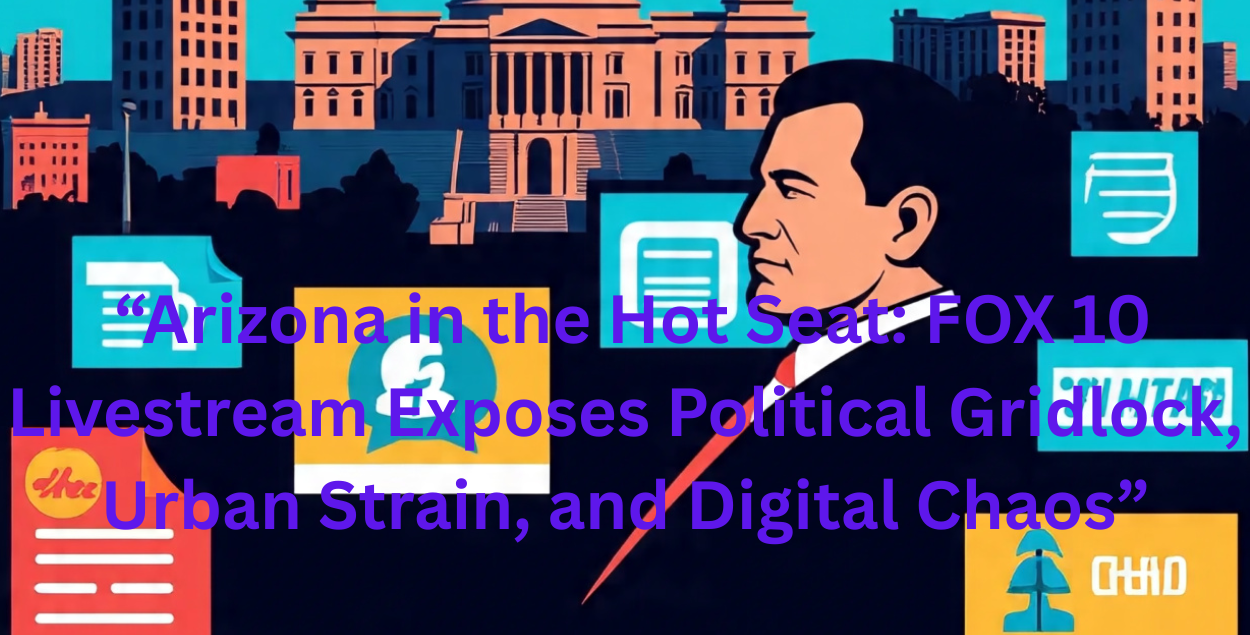FnF News
Arizona Unfiltered: FOX 10 Livestream Exposes a State Split by Heat, Politics, and Digital Chaos
By Khadija Khan | FNF News | July 2, 2025
Phoenix, AZ — On July 1, FOX 10 Phoenix’s livestreamed afternoon segment, branded “FOX 10 Talks,” began as a casual community check-in. But beneath the surface of viral videos and viewer commentary, the livestream exposed a deeper narrative: an Arizona caught between progress and paralysis.
Over the course of two hours, hosts and guests discussed rising temperatures, political divides, and the digital fragmentation of public trust—all while livestream footage revealed quiet scenes of daily struggle in Phoenix, from bus delays to emergency cooling shelters. What emerged was a raw and revealing portrait of a state cracking under extreme heat, policy fatigue, and polarized media ecosystems.
Social Media: Where Arizona’s Future Is Argued and Meme’d in Real Time
The livestream began with commentary on social media trends, featuring TikToks and local Twitter (now X) debates about Arizona’s escalating climate crisis and Governor Katie Hobbs’ embattled education budget.
One clip featured a student-run protest outside the Maricopa County school board, which went viral for its emotional plea for more school psychologists and safe drinking water—basic necessities now framed as “political.”
A panelist, media analyst Cynthia Palomar, warned:
“Our civic discourse has moved to unmoderated platforms. Policy is now being filtered through algorithmic rage.”
Indeed, hashtags like #HotClassrooms and #DesertKidsDeserveMore trended locally during the broadcast. Meanwhile, state officials tried to clarify misinformation spreading about the Governor’s funding plan. The FOX 10 chat was flooded with polarized reactions—half praise, half outrage.
Education Budget Wars: Political Battlelines in the Desert
Governor Hobbs’ proposed $3.2 billion education bill became the livestream’s main political flashpoint. The bill would:
- Increase base teacher salaries by 18%.
- Create a statewide classroom air-conditioning repair fund.
- Provide laptops and free lunches to Title I school districts.
While many parents and educators welcomed the move, Republican leaders labeled it “reckless spending.” State Senate Majority Leader Greg Marks (R-Phoenix) argued live via call-in:
“There’s no accountability here. This is a bailout for failed districts, not a long-term investment.”
But teachers like Rosa Villanueva of Chandler Unified pushed back:
“I work 12-hour days in rooms that hit 92 degrees by noon. If we’re not going to fund education during climate emergencies, when are we going to?”
A late-breaking poll from the Arizona Republic, cited during the stream, showed 54% of voters support the Hobbs education package, but only 38% believe it will pass the legislature.
Heatwave Reality: Urban Phoenix Faces the Limits of Adaptation
Perhaps the most visually striking part of the livestream came from city street cams: shimmering roads, empty sidewalks, and heat distortion rippling through the skyline.
Phoenix officially hit 114°F (45.5°C) for the third day in a row, with heat indices reaching 120°F. Emergency responders reported:
- 212 heat-related 911 calls in 24 hours.
- 12 critical hospitalizations, mostly elderly and unhoused.
- Multiple city buses breaking down mid-route due to engine overheating.
FOX 10 showed footage from a pop-up cooling shelter in Maryvale, where volunteers distributed water bottles and electrolyte tablets. Still, city officials acknowledged that “more than 8,000 vulnerable residents remain outside.”
The Arizona Department of Health Services confirmed that June 2025 saw a 34% increase in heat-related fatalities compared to June 2024. Climate experts now warn that Phoenix may become the first major U.S. city where midday outdoor labor is physically unsustainable by 2030.
Digital Disruption and Media Fatigue: Can Local News Still Mediate Truth?
The livestream also offered a rare self-reflective moment: anchors debated the role of local media in a time when attention spans are shaped by TikTok and misinformation spreads faster than fact-checks.
Journalist Adrian Ferris posed a sobering question to viewers:
“If the loudest voice wins on the internet, what happens to the truth?”
This resonated in the live chat, where users demanded transparency on funding for cooling centers, accused school boards of corruption, and debated whether the state’s wildfire response was underreported due to political bias.
At one point, FOX 10’s own stream was interrupted by a sudden influx of spam bots spreading fake election data—forcing a temporary chat freeze. It was a perfect, if accidental, metaphor for the day’s central theme: public conversation in Arizona is now a battleground.
FNF News Analysis: What the Livestream Taught Us
What made the July 1 FOX 10 livestream so revealing was its unintended honesty. Not scripted or edited for broadcast, it captured the ambient tension of a state dealing with too much heat, too much noise, and not enough agreement on what to do next.
From classroom crises to collapsed bus engines, from misinformation storms to literal ones forming over the desert, Arizona is not on the brink—it’s already over the edge.
What remains to be seen is whether civic trust, media institutions, and leadership can catch up to the urgency that was visible on every pixel of the stream

